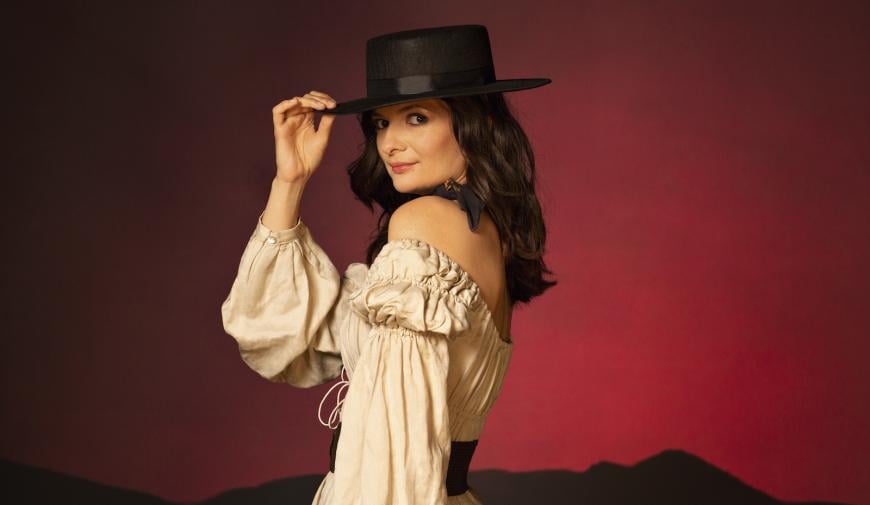
After far too long a wait, gorgeous voiced French mezzo-soprano Marianne Crebassa has returned to the Erato fold with a generous and eclectic album that explores the Spanish roots of her grandparents and great grandparents. Although she was too young to have met Grandma and Grandpa before they died, her new album, Séguedilles (Warner Classics), explores the marriage of France and Spain that is in her heart and DNA.
The album, predictably, begins with Carmen’s Habanera (Love is a rebellious bird) from Georges Bizet’s opera, and returns to the opera with the Séguedille (By the ramparts of Seville) and, for the last track, le Chanson bohème, aka “Les tringles des sistres tintaient avec un éclat métallique” (The sistrums’ rods were jingling). As unavoidable as these choices may be, they do not showcase Crebassa at her best. Unless your understanding of Carmen welcomes an energetic woman with ravishing low notes and free highs who is less dangerous than relaxed at the start of certain phrases, you may find Crebassa’s interpretations lacking. Granted, there was only one Conchita Supervia— but when you hear how creatively she and other women mold Bizet’s familiar melodies to their own expressive ends, you can literally feel Carmen’s skill at wrapping Don José around her little finger and spitting him out like some annoying piece excess tobacco in the cigarettes she rolled by hand.
When we turn to the deceptively titled aria, “Vivan los que ríen!” (Long live those who laugh!) from Miguel de Falla’s La vida breve (The brief life), however, the sadness that comes naturally to Crebassa produces a performance so moving that there is no desire to hunt for comparisons. True, even Spaniards may need the libretto to understand every word Crebassa sings, but anyone attuned to the sound of the human voice needs no words to feel the emotion of a woman who sings (in translation), “The life of the poor, full of suffering, can be short. Even my songs are coming out sad today.” The aria also gives us our first tantalizing opportunity to hear the voice of tenor Stanislas de Barbeyrac, who in his four too brief appearances makes this listener eager for more. The Orchestre National du Capitole de Toulouse under Ben Glassberg is quite wonderful here.
Jules Massenet’s “Quand la femme a vingt ans” (When a woman of 20 years) from Don Quichotte and four of Jesús Guridi’s beautiful 6 canciones castellanas (Six Castilian songs) confirm that sadness and longing come far more easily to Crebassa than joy. For example, Guridi’s fifth song, “Cómo quieres que adivine” (How am I supposed to guess) comes up a bit short on everything but beauty. But in the set’s final song, “Mañanita de San Juan,” (On the morning of St. John’s Day) with Alphonse Cemin on piano, Crebassa’s inimitable mixture of tenderness and sensual longing make for unforgettable artistry.
Yes, play it again; it really is that beautiful. It sounds best in hi-resolution, but if you’re short of cash, YouTube gives you a nice taste of the beauty Crebassa and Warner have invested in the recording.
Although the ending of Massenet’s “Nuit d’Espagne” (A night in Spain) lacks the final kick, the second verse is performed so wonderfully — Thibaut Garcia’s guitar is special — that, as with much of the album, we eagerly anticipate its other delights. There are many, from French and German composers Camille Saint-Saëns, Federico Mompou, de Falla again, Ravel (twice), and Jacques Offenbach. Yes, Offenbach’s lively duet, “Vous a-t’on dit souvent” (Have you often been told), again with Barbeyrac, from La Périchole. If Crebassa can’t get all the lightness this music requires into her voice or match the orchestra’s exuberance, her performance is a joy nonetheless.
Indulge. There are enough heart-tugging performances on Séguedilles to suggest it could be short-listed for awards within the year. It has certainly won me over.





